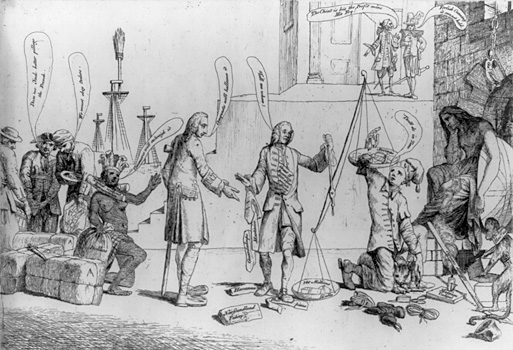Sugar Act of 1764, also called the Revenue Act or the Molasses Act, was a law that sought to increase the amount of money Britain (now also called the United Kingdom) raised from the American Colonies. The act was the first in a series of revenue laws that the British Parliament passed in the 1760’s in an effort to raise income. The Sugar Act placed a tax of three pence on each gallon (3.8 liters) of molasses that entered the colonies from ports outside the British Empire. The colonists insisted that, because they had no representation in Parliament, Britain had no right to tax them. Colonial discontent over the Sugar Act and other measures led to protests about “taxation without representation” and set into action the events that led to the American Revolution (1775-1783).
The main purpose of earlier British laws governing American trade was to regulate trade rather than to raise money. For example, Parliament passed the Molasses Act of 1733 to help the sugar growers in Britain’s Caribbean colonies. The act put a six pence per gallon duty on molasses imported from non-British territories. Colonists had largely avoided the duty by smuggling or by bribing customs agents to take smaller sums of money. The Sugar Act lowered the rate to three pence per gallon, an amount that Parliament thought the colonists could better afford to pay. However, the act also provided for strict enforcement.
The British defeated an alliance of French and Indian forces during the French and Indian War (1754-1763). The war, which was called the Seven Years’ War in Europe and Canada, had been costly to Britain and greatly increased its national debt.
King George III and Parliament believed the time had come for the colonists to help pay the costs of maintaining British services in America. At the urging of George Grenville, the king’s chief Cabinet minister, Parliament passed the Sugar Act on April 5, 1764. Its chief provision was the tax on molasses. But the act also contained stricter regulations on the trade of other goods and allowed British officials to search the property of people suspected of violating the law.

The Sugar Act came at a time of economic uncertainty in colonial America. The decrease in British military spending toward the end of the French and Indian War had caused a depression in the colonies, and colonists feared the Sugar Act would make conditions worse.
American rum producers—who used imported molasses as a raw material—were the most vocal opponents of the act because they believed the tax would destroy their profits. Nearly all the rum distilleries in America operated in the northeastern colonies, and the legislatures of Massachusetts, Rhode Island, and New York complained about the act prior to its passage. Some complaints addressed only the economic hardship the act might cause, while others focused on whether Parliament had a right to tax the American Colonies.
The colonists reacted to the Sugar Act in a variety of ways. Many colonists did not fully understand the measure or know how it would affect them. Some blamed the tax for the depression, though the economy had shown signs of weakness before the act’s passage. Many merchants attempted risky smuggling ventures to evade the British Navy. Some businesspeople hoped to continue previous arrangements with customs officials, who in many cases accepted bribes instead of collecting duties. However, Grenville sent new officials who insisted on enforcing the law, and British seamen often boarded trading vessels to verify customs paperwork. Officials seized illegal cargoes and, in some cases, could also confiscate the ship.
In the 10 years following the Sugar Act’s passage, the act’s measures provided about 80 percent of the revenue Britain collected from the colonies. Still, colonial uproar over the Sugar Act became overshadowed by other concerns, such as the Stamp Act of 1765, which established an even more unpopular tax. In 1766, Parliament reduced the tax on molasses to 1 pence per gallon.
